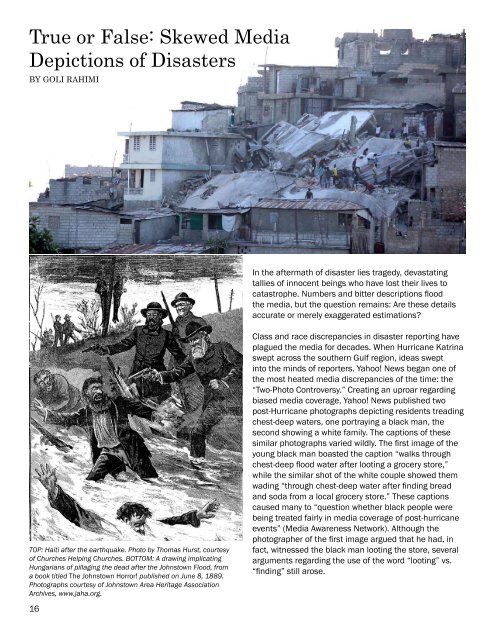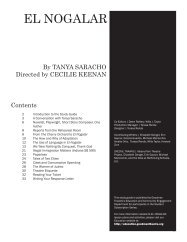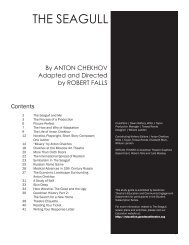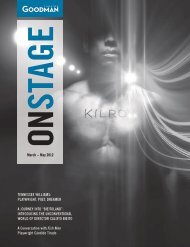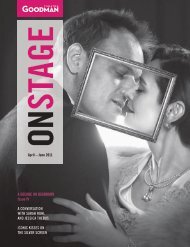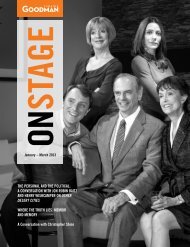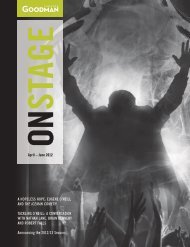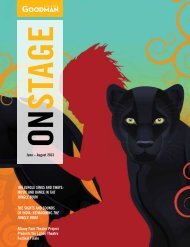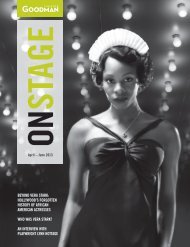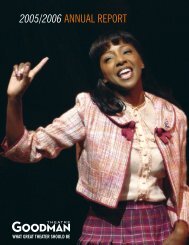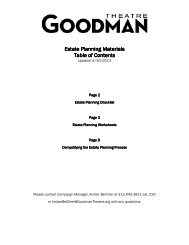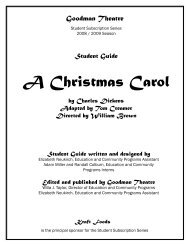A True History of the Johnstown Flood Study - Goodman Theatre
A True History of the Johnstown Flood Study - Goodman Theatre
A True History of the Johnstown Flood Study - Goodman Theatre
You also want an ePaper? Increase the reach of your titles
YUMPU automatically turns print PDFs into web optimized ePapers that Google loves.
<strong>True</strong> or False: Skewed Media<br />
Depictions <strong>of</strong> Disasters<br />
BY GOLI RAHIMI<br />
In <strong>the</strong> aftermath <strong>of</strong> disaster lies tragedy, devastating<br />
tallies <strong>of</strong> innocent beings who have lost <strong>the</strong>ir lives to<br />
catastrophe. Numbers and bitter descriptions flood<br />
<strong>the</strong> media, but <strong>the</strong> question remains: Are <strong>the</strong>se details<br />
accurate or merely exaggerated estimations?<br />
TOP: Haiti after <strong>the</strong> earthquake. Photo by Thomas Hurst, courtesy<br />
<strong>of</strong> Churches Helping Churches. BOTTOM: A drawing implicating<br />
Hungarians <strong>of</strong> pillaging <strong>the</strong> dead after <strong>the</strong> <strong>Johnstown</strong> <strong>Flood</strong>, from<br />
a book titled The <strong>Johnstown</strong> Horror! published on June 8, 1889.<br />
Photographs courtesy <strong>of</strong> <strong>Johnstown</strong> Area Heritage Association<br />
Archives, www.jaha.org.<br />
16<br />
Class and race discrepancies in disaster reporting have<br />
plagued <strong>the</strong> media for decades. When Hurricane Katrina<br />
swept across <strong>the</strong> sou<strong>the</strong>rn Gulf region, ideas swept<br />
into <strong>the</strong> minds <strong>of</strong> reporters. Yahoo! News began one <strong>of</strong><br />
<strong>the</strong> most heated media discrepancies <strong>of</strong> <strong>the</strong> time: <strong>the</strong><br />
“Two-Photo Controversy.” Creating an uproar regarding<br />
biased media coverage, Yahoo! News published two<br />
post-Hurricane photographs depicting residents treading<br />
chest-deep waters, one portraying a black man, <strong>the</strong><br />
second showing a white family. The captions <strong>of</strong> <strong>the</strong>se<br />
similar photographs varied wildly. The first image <strong>of</strong> <strong>the</strong><br />
young black man boasted <strong>the</strong> caption “walks through<br />
chest-deep flood water after looting a grocery store,”<br />
while <strong>the</strong> similar shot <strong>of</strong> <strong>the</strong> white couple showed <strong>the</strong>m<br />
wading “through chest-deep water after finding bread<br />
and soda from a local grocery store.” These captions<br />
caused many to “question whe<strong>the</strong>r black people were<br />
being treated fairly in media coverage <strong>of</strong> post-hurricane<br />
events” (Media Awareness Network). Although <strong>the</strong><br />
photographer <strong>of</strong> <strong>the</strong> first image argued that he had, in<br />
fact, witnessed <strong>the</strong> black man looting <strong>the</strong> store, several<br />
arguments regarding <strong>the</strong> use <strong>of</strong> <strong>the</strong> word “looting” vs.<br />
“finding” still arose.


